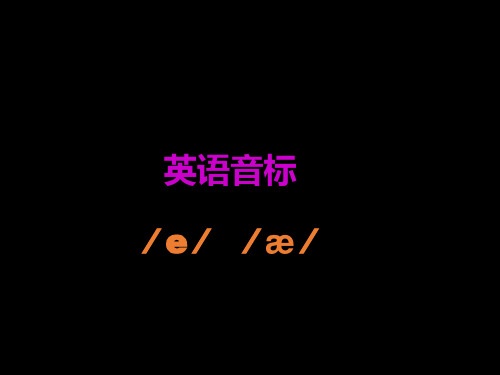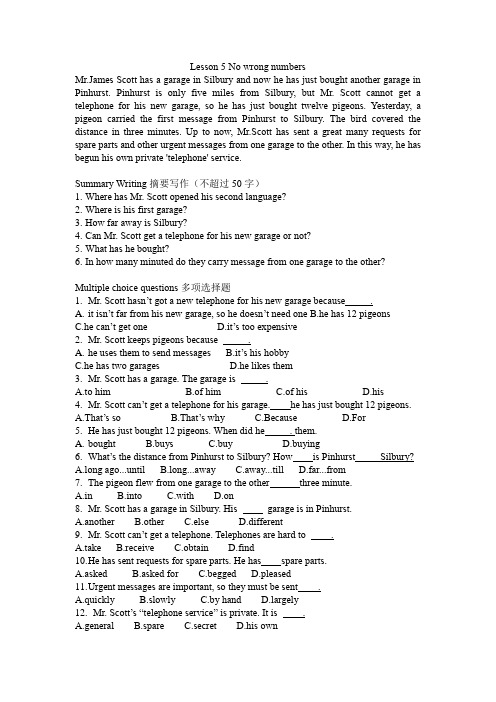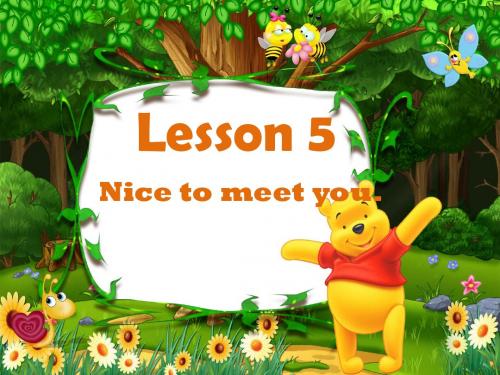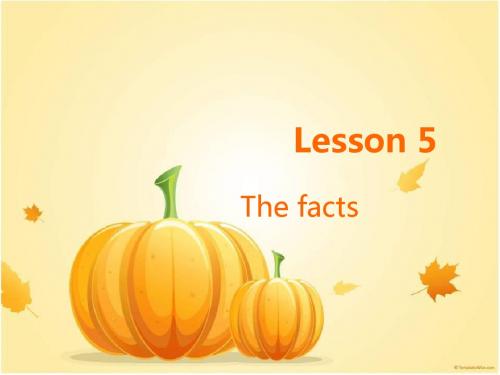成人版新概念 Lesson 5
新概念英语第一册(Lesson5)课文及学习笔记-全

新概念英语第一册(Lesson5)课文及学习笔记-全新概念英语| 第一册(Lesson 5)课文及学习笔记【课文内容及译文】Lesson 5 Nice to meet you很高兴见到你。
Listen to the tape then answer this question.Is Chang-woo Chinese?MR. BLAKE: Good morning.STUDENTS: Good morning, Mr. Blake.MR. BLAKE: This is Miss Sophie Dupont.Sophie is a new student. She is French.MR. BLAKE: Sophie, this is Hans. He is German.HANS: Nice to meet you.MR. BLAKE: And this is Naoko. She's Japanese.NAOKO: Nice to meet you.MR. BLAKE: And this is Chang-woo. He's Korean.CHANG-WOO: Nice to meet you.MR. BLAKE: And this is Luming. He is Chinese. LUMNG: Nice to meet you.MR. BLAKE: And this is Xiaohui. She's Chinese, too. XIAOHUI: Nice to meet you.布莱克先生:早上好。
学生:早上好,布莱克先生。
布莱克先生:这位是索菲娅.杜邦小姐。
索菲娅是个新学生。
她是法国人。
布莱克先生:索菲娅,这位是汉斯。
他是德国人。
汉斯:很高兴见到你。
布莱克先生:这位是直子。
她是日本人。
直子:很高兴见到你。
布莱克先生:这位是昌宇。
他是韩国人。
昌宇:很高兴见到你。
新概念英语第一册 Lesson 5完整版本

疯狂的 事实
男人 旗帜
手 猫 抓住 老鼠
Lesson 5 Nice to meet you.
he
China 中国
Chinese 中国人
Japan 日本
[dʒə‘pæ n]
he
she
Japanese 日本人
[‘dʒæ pə’ni:z]
Korea 韩国
[kə’riə]
he Korean 韩国人
[kə’riən]
再见
good bye
晚安
good night
祝你好运 good luck
课文讲解
• Good用法拓展 • 1,be good at 善于,在 …方面学的好 • 2,be good to sb 对某人好 • 3,be as good as one’s words 说话算数 • 4,as good as 和…一样好
he
France 法国
[fra:ns]
French 法国人
[frentʃ]
he
Germany 德国
[’dʒə:məni]
巴拉克
German 德国人
[’dʒə:mən]
某国
(中) China [‘t∫aɪnə]
(日) Japan [dʒə‘pæ n]
(韩) Korea [kə’riə]
(德) Germany [’dʒɜ:məni]
• ② adj. 和蔼的,友好的 He is very nice to his neighbours.
• ③ adj. 使人高兴的,令人愉快的 It is so nice to have you here.
too
• adv.用于肯定句中(强调也) • adv.太过于…… • eg:She talks too much.
新概念英语第二册课后练习答案lesson5

新概念英语第二册课后习题答案详解Lesson 5练习答案Key to written exercises1.关键句型练习答案A What happened: carried (1.4 ) ; covered (1. 5 )What has happened: has just bought (1.1) ; has just bought (11.3-4);has sent(1.6);has begun(1.8)C 1 What did you buy … ?2 he has never l ent …3 Have you burnt … ?4 He fought …5 They have already left .6 When did you lose … ?7 Did you listen … ?8 We have just won …2.难点练习答案A 1 On the way2 in the way3 By the way4 in this/a way5 in the wayB 1 There is a spare wheel in the back of the car.2 I always go on excursions in my spare time.3 ‘Have you any old clothes to spare? ’he asked.4 The guest slept in our spare room.5 ‘Spare me!’begged the prisoner.3.多项选择题答案1. c根据课文底第3行but Mr. Scott cannot get a telephone for his new garage判断,只有c. He cant get one 是对的。
2. a根据课文内容,养鸽子的目的是为了传递信息,只有a. he uses them to send messages 与课文的意思相同,而其他3个选择都没有这种含义。
(完整版)新概念英语第二册Lesson5课文+练习

Lesson 5 No wrong numbersMr.James Scott has a garage in Silbury and now he has just bought another garage in Pinhurst. Pinhurst is only five miles from Silbury, but Mr. Scott cannot get a telephone for his new garage, so he has just bought twelve pigeons. Yesterday, a pigeon carried the first message from Pinhurst to Silbury. The bird covered the distance in three minutes. Up to now, Mr.Scott has sent a great many requests for spare parts and other urgent messages from one garage to the other. In this way, he has begun his own private 'telephone' service.Summary Writing摘要写作(不超过50字)1.Where has Mr. Scott opened his second language?2.Where is his first garage?3.How far away is Silbury?4.Can Mr. Scott get a telephone for his new garage or not?5.What has he bought?6.In how many minuted do they carry message from one garage to the other? Multiple choice questions多项选择题1.Mr. Scott hasn’t got a new telephone for his new garage because .A.it isn’t far from his new garage, so he doesn’t need oneB.he has 12 pigeonsC.he can’t get oneD.it’s too expensive2.Mr. Scott keeps pigeons because .A.he uses them to send messagesB.it’s his hobbyC.he has two garagesD.he likes them3.Mr. Scott has a garage. The garage is .A.to himB.of himC.of hisD.his4.Mr. Scott can’t get a telephone for his garage. he has just bought 12 pigeons.A.That’s soB.That’s whyC.BecauseD.For5.He has just bought 12 pigeons. When did he . them.A.boughtB.buysC.buyD.buying6.What’s the distance from Pinhurst to Silbury? How is Pinhurst Silbury?A.long ago...untilB.long...awayC.away...tillD.far...from7.The pigeon flew from one garage to the other three minute.A.inB.intoC.withD.on8.Mr. Scott has a garage in Silbury. His garage is in Pinhurst.A.anotherB.otherC.elseD.different9.Mr. Scott can’t get a telephone. Telephones are hard to .A.takeB.receiveC.obtainD.find10.H e has sent requests for spare parts. He has spare parts.A.askedB.asked forC.beggedD.pleased11.U rgent messages are important, so they must be sent .A.quicklyB.slowlyC.by handrgely12.Mr. Scott’s “telephone service” is private. It is .A.generalB.spareC.secretD.his own。
新概念Lesson5 课件 第5课

German /’dʒɜ:mən/ 德国人
French /frentʃ/ 法国人
New words
Mr. /`mɪstə/ 先生 good /gʊd/ 好 morning /`mɔ:nɪŋ/ 早晨 Miss /mɪs/ 小姐 new /nju:/ 新的 student /`stju:dənt/ 学生 French /frentʃ/ 法国人 German /`dʒɜ:mən/ 德国人
Let’s play a game
• Chant My name’s… I am … What’s your name?
Sophie Hans Naoko Chang-Woo Luming Xiaohui French German Japanese Korean Chinese Chinese
பைடு நூலகம்
Question
nice / naɪs/ 美好的 meet / mi: t/ 遇见
Japanese/dʒæp`n i:z/
日本人
Korean /kə`rɪən/ 韩国人 Chinese / tʃaɪ`ni:z/中国人 too /tu: / 也
Key structures
• Nice to meet you.
用于初次与同学、朋友见面等非正式场合。 正式场合常用 How do you do?
Lesson 5
Nice to meet you.
1 3
2 4
嘴 巴 和 手 不 一 样
• Words
Revision
11. 伞 12. 请 13. 这里 14. 我的 15. 票 16. 号码 17. 五 18. 对不起的 19. 衣帽存放处 20. 先生
1. 原谅 2. 我(宾格) 3. 是的 4. 这 5. 你的,你们的 6. (女用) 手提包 7. 原谅,再说一次 8. 它 9. 感谢你(你们) 10. 非常地
新概念英语Lesson 5

• circle 圆圈;around 坏绕
• weight 体重;width 宽度;length 长度
• meanwhile adv. 同时
• at the same time 同时
• refuse v. 拒绝
• refuse to do sth=be unwilling to do sth 不愿意做某事
• • • • • • •
well-known 为复合形容词,修饰magzine n. + adj. life-long 终生的 adj.+adj. red-hot 炙手可热的 n.+ v.-ing peace-loving 热爱和平的 n.+v.-ed man-made 人造的 adj.+ v.-ing good-looking 漂亮的 adj. + v.-ed kind-hearted 仁慈的
• the Summer Palace 颐和园; the Palace Museum 故 宫; • the White House 白宫
• publish v. 出版,发表
• fax n. 传真
• letter 信件;delivery 快递; typewriter 打字机
• impatient adj. 不耐烦的
• anxious焦虑的;irritated易怒的; • hot-tempered暴 解雇
• dismiss 开除;expel 开除
• originally adv. 起初,原先
• in the beginning 开始
• instruct v. 吩咐,指示
• Not only had the poor man been arrested, but he had been sent to prison as well. • not only 放在句首引起部分倒装 • 倒装有时是句子结构需要,有时是表示强调修辞手法需要。 • only所修饰的副词,介词短语或状语从句放在句首时,要用: • only+ 状语+ be /助动词/情态动词+主语及其他 • Only when he told me the news did I know what had happened. • Only in this way can you make progress in your English. • Only through education can we rise in the world.
新概念 Lesson 5课件

/æ/ /e/ /i:/ /ɪ/ /ɔ:/ /ɒ/ /u:/ /ʊ/ /ɑ:/ /ʌ/
/ɜ:/
bird /bɜːd/
nurse /nɜːs/
word /wɜːd/ skirt /skɜːt/
dirty /'dɜːtɪ/ learn /lɜːn/
/ə/
actor /'æktə/ center /ˈsentə/
Ottawa 渥太华
西班牙 Spain
法国 France
韩国 Korea
日本 Japan
Country
China
America (The U.S.A.) British (UK) France
Canada
korea
Japan
Flag
Capital Language People
Beijing
2. His books _____ on the table and his bag _____ on the chair. 3. What _____ your uncle’s job? He and my father _____ both(两者
都)drivers. 4. Lily and I _____ good friends, our parents(父母) _____ friends, too. 5. Some milk _____ in the fridge(冰箱).
Where is your book? How old is the girl? What is your mother? Who is the man?
职业
★ what are you?
What does your mother do? What’s her job? What’s Tom’s job? What is your sister?
Lesson 5 新概念英语第二册课件

1. pigeon n. 鸽子
词组: 信鸽 ___c_a__rr_i_e_r__p_i_g_e_o__n____
2. message n.信息(可数名词)
同义词:__i_n_f_o_r_m__a_t_i_o_n___(不可数名词) 电话用语: leave sb. a message ___给___s_b_._留__口__讯_________ take sb. a message _____替__s_b__.传__话___________
引申:
3)some…others _一__些__…__…___,__其__他__的___…__…_ = some…other + 名词
e.g. There are a lot of students on the playground. Some are playing basketball, others are playing volleyball.
______覆___盖_______ Look! Emma Watson’s the cover girl of Times
again. _____封__面________
5. request v. 要求,请求
词组:__h__a_v_e__a__r_e_q_u__e_s_t__fo__r…__ 对……有请求,需求 翻译:我想要个蛋糕。
辨析:another/other/the other用法
2)one…the other
已__经__知__道___只__有__2_个__,___“__一__个__,___另__一__个_ ”
e.g. One hand is clean, the other is dirty.
1. Mr. James Scott has a garage in Silbury and now he has just bought another garage in Pinhurst.
- 1、下载文档前请自行甄别文档内容的完整性,平台不提供额外的编辑、内容补充、找答案等附加服务。
- 2、"仅部分预览"的文档,不可在线预览部分如存在完整性等问题,可反馈申请退款(可完整预览的文档不适用该条件!)。
- 3、如文档侵犯您的权益,请联系客服反馈,我们会尽快为您处理(人工客服工作时间:9:00-18:30)。
am + not→am not is + not→isn’t(is not) are + not→aren’t (are not) 我是一个工人。 I am a worker. 我不是一个工人。I am not a worker. 它是一只猫咪。 It is a cat. 它不是一只猫咪。It is not(isn’t)a cat.
根据发音规则,圈出每组中元音字母组合发音相 同的单词。
1.thirty beer thirsty wheat 2. bank king her nurse 3.turtle bird rabbit knee 4.room run shirt term
[ә] 发这个音的字母和字母组合ure er ar or a • ure: picture • er:teacher brother dinner father sister • ar: sugar • or:doctor • a:panda about above camera sofa China • 根据发音规则,找出发[ә]的2个单词写在后面的
Nice to meet you.
Chinese中国人 China中国
French法国人 France法国
German德国人 Germany德国
Japanese日本人 Japan日本
Korean韩国人 Korea韩国
Grammar
҉ 在把一个人介绍给另一个人时: 句型
This is +姓名 这是玛丽。This is Mary. ҉向别人介绍自己时: My name is / I am---
பைடு நூலகம்
It’s an English car.
What make is it?
It'sIt's a Ford. a Fiat. It's an an American car It's Italian car
2015/12/23
What make is it?
• • • • • • • • • • •
China n.中国
我是中国人。 I am Chinese. n. 中国人(单复同形)汉语 adj. 中国的
Japan n.日本
他妈妈是日本人。
His mother is Japanese.
n. 日本人(单复同形)/日语 adj. 日本的
Korea n.韩国
他爸爸是韩国人。
His father is Korean.
Lesson 5 Nice to meet you. —By Filin
ᴥ meet v. 遇见,碰见 非正式场合下初次见面时的客套用语 Nice to meet you. 回答: Nice to meet you, too.
正式场合中:
How do you do? 你好 回答: How do you do?
How do you do? 你好。 回答:How do you do? 你好。
2015/12/23
She is from Japan.
She comes from Japan.
2015/12/23
He comes from Korea.
He is from Korea.
2015/12/23
He comes from China. He is from China.
My name is... / I am... 早上好,我是丹尼. Good morning, I'm Danny. 晚上好,丹尼,这是李明。 Good evening, Danny. This is Li Ming
2015/12/23
描述国籍句型:
主语+ be+国籍(哪国人) 我是中国人。 I am Chinese. 他是德国人。 He is German. 她是日本人。 She is Japanese. 他们是韩国人。 They are Koreans. 改错
n. 韩国人(复数+s)/韩语 adj. 韩国的
Germany n.德国
我奶奶是德国人。
My grandmother is German.
n. 徳国人(复数+s)/德语 adj. 徳国的
France n.法国
我的朋友是法国人。
My friend is French.
n. 法国人(the French)/法语 adj. 法国的
在早上/下午/晚上 morning afternoon in the evening 在中午 at noon 在夜里 at night
2015/12/23
ᴥ good adj. 好 形容词
bad 坏的
1.形容词修饰名词放在名词前,做定语。 adj.(形容词)+ n.(名词) 2.形容词放在be动词后,作表语。
一本好书 一位好老师
a good book. a good teacher.
我的老师很好。
My teacher is good.
2015/12/23
ᴥ
new
adj. 新的
反 义
old 旧的
那是我的新衬衫。
That is my new shirt.
我的西服是新的。
My suit is new. 这是你的旧连衣裙吗? Is this your old dress? Yes. Your dress is old, too.
Key words
ᴥ Mr. 先生(不可单独使用) Mr. + 姓氏 王先生 Mr. Wang
ᴥ Miss 小姐(未婚)
Miss+姓氏 李小姐 Miss Lee
҉ Mrs. 女士(已婚)+丈夫的姓氏
格林女士 Mrs. Green
ᴥ
Good
morning n. 早晨
morning. 早上好。 afternoon. 下午好 evening. 晚上好。 night. 晚安。
2. 读音标写单词。 [bi:] 3. 连线。 meat thirsty driver animal
[ә:] 发这个音的字母和字母组合er ir ur ear or er: her serve term ir:bird girl skirt first dirty shirt ur:nurse Thursday turtle purple curtain ear:early learn or: word work world
I come from French. I am France.
He comes from Germany.
He is from Germany.
2015/12/23
非正式场合: 问候语 句型 = Glad to meet you. 正式的场合:
Nice to meet you. 很高兴见到你。 Nice to meet you, too.见到你我也很高兴。
你是我的叔叔。 You are my uncle. 你不是我的叔叔。You are not (aren’t)uncle.
这是我的朋友。 This is my friend. 这不是我的朋友。This is not (isn’t) my friend.
带 有 be 动 词 的 陈 述 句 变 否 定 句
( ) ④she
big
fish sister first
in
teacher about work
money
we girl shirt
( ) ⑧tree
bean
doctor sea [swi:t] [′bizi]
clean
skirt sit [hә:] [′dɔktә]
chin
china picture [′sistә] [li:f] [hi:]
Question
1. Is Chang—woo Chinese?
2. Who is German? 3. How many students are there in the class?
2015/12/23
҉ 在把一个人介绍给另一个人时: 句型 This is +姓名 ҉向别人介绍自己时:
2015/12/23
She comes from China,too.
She is from China,too.
2015/12/23
the
Recite
Cars?
Yes , it is. It is a Volvo.
You are right . Is it a Chinese car?
横线上。
• • • •
1.mother sofa road smile 2.sit father sister food 3. hair deer tiger China 4.sugar soon ear leader
音标[i:] [i] [ә:] [ә] 练习
1. 找出下列发音不相同的单词。 ( ( ( ( ( ( ( ( ) ①he ) ②pig ) ③thirty ) ⑤sweets ) ⑥teacher ) ⑦tiger ) ⑨father ) ⑩happy [bә:d] [ә:] [i:] [ә] [i] [si:] feet is bird bread dog her green ship food
2015/12/23
ᴥ
too adv. 也 I am a student.
我是一个学生。
他也是一个学生。 He is a student, too. 我不是一个学生。 I am not a student. 他也不是一个是学生。 He isn't a student, either. 也
too 用在肯定句或疑问句句末, 前面通常加逗号. either 用在否定句句末, 前面通常加逗号.
